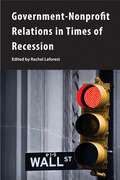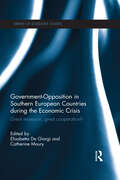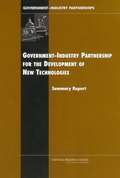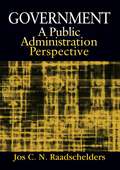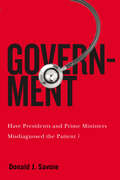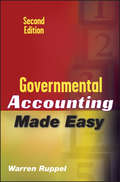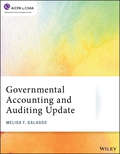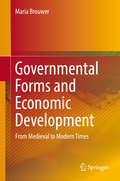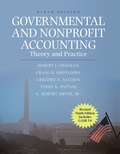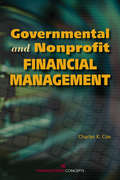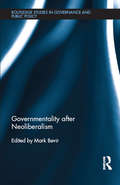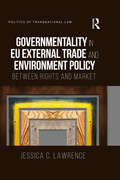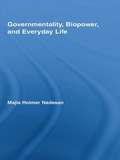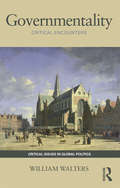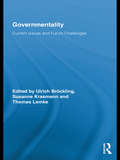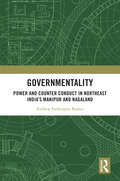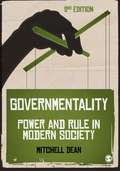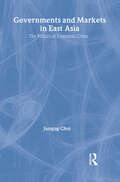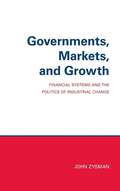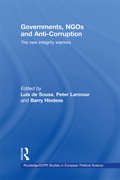- Table View
- List View
Government-Nonprofit Relations in Times of Recession (Queen's Policy Studies Series #173)
by Rachel LaforestAn exhaustive study of changing nonprofit policy issues in response to the economic recession.
Government-Opposition in Southern European Countries during the Economic Crisis: Great Recession, Great Cooperation? (Library of Legislative Studies)
by Elisabetta De Giorgi Catherine MouryAs a result of the financial crisis, opposition parties have had to choose between the need to cooperate with the majority in order to contribute to necessary socio-economic changes, and the opportunity to stress their adversarial position vis-à-vis governments taking radical and unpopular measures. This book examines how opposition parties address this dilemma. It relies on a qualitative and quantitative analysis of the behaviour of the opposition parties in parliament, in light of the socio-economic issues that have arisen in recent years. It focuses in particular on the impact that the economic malaise has had on the government-opposition dynamics in the four southern European democracies most acutely hit by the crisis: Greece, Italy, Portugal and Spain, as well as in the European Parliament. Each chapter utilizes a combination of empirical data analysis and qualitative process-tracking to understand the opposition parties’ complicated choice between supporting and dissenting.This book was originally published as a special issue of the Journal of Legislative Studies.
Government-industry Partnerships For The Development Of New Technologies
by Technology Board On Science Economic PolicyThis report reviews a variety of partnership programs in the United States, and finds that partnerships constitute a vital positive element of public policy, helping to address major challenges and opportunities at the nexus of science, technology, and economic growth.
Government: A Public Administration Perspective
by Jos C. RaadscheldersMost public administration texts overly compartmentalize the subject and don't interconnect the various specializations within government, which leaves a serious gap in preparing students for public service. Government: A Public Administration Perspective is designed to fill that void. It provides a comprehensive, multidisciplinary view of government that includes perspectives from political science, political theory, international relations, organizational sociology, economics, and history. The text draws on classic and modern literature from all these areas to analyze government at four different levels - ideational, societal, organizational, and individual layers. It links public administration's various subfields - human resource management, budgeting, policy making, organizational theory, etc. - into a holistic framework for the study of government. It also includes an extensive bibliography drawing from American and European literature in support of the book's global, historical, and comparative approach.
Government: Have Presidents and Prime Ministers Misdiagnosed the Patient? (McGill-Queen's/Brian Mulroney Institute of Government Studies in Leadership, Public Policy, and Governance)
by Donald J. SavoieCitizens have lost trust in their institutions of public governance. In trying to fix the problem, presidents and prime ministers have misdiagnosed the patient, failing to recognize that government bureaucracies are inseparable from political institutions. As a result, career officials have become adroit at managing the blame game but much less so at embracing change.Donald Savoie looks to the United States, Great Britain, France, and Canada to assess two of the most important challenges confronting governments throughout the Western world: the concentration of political power and the changing role of government bureaucracy. The four countries have distinct institutions shaped by distinct histories, but what they have in common is a professional non-partisan civil service. When presidents and prime ministers decide to expand their personal authority, national institutions must adjust while bureaucracies grow to fill the gap, paradoxically further constricting government efficacy. The side effects are universal – political power is increasingly centralized; Parliament, Congress, and the National Assembly have been weakened; Cabinet has lost standing; political parties have been debased; and civil services have been knocked off their moorings.Reduced responsibility and increased transparency make civil servants slow to take risks and politicians quick to point fingers. Government astutely diagnoses the problem of declining trust in government: presidents and prime ministers have failed to see that efficacy in government is tied to well-performing institutions.
Governmental Accounting Made Easy
by Warren RuppelA hands-on guide to the ins and outs of governmental accounting--made easy!Governmental Accounting Made Easy, Second Edition equips you with the tools you need to run the financial and accounting operations within your organization. This complete and straightforward manual covers a broad range of governmental accounting topics that fall under the Governmental Accounting Standards Board, and its recently revised financial reporting model.Boiling down the complicated details of governmental accounting into manageable essentials, author Warren Ruppel, a leading authority on governmental accounting, offers practical information in easy-to-understand terminology. Even if you do not have a professional understanding of accounting principles and financial reporting, the Second Edition makes it all clear with accounting rules explained in terms anyone can understand, to help you better fulfill your managerial and fiduciary duties.Always practical and never over-technical, this helpful guide:Discusses basic accounting terminologyClearly explains fund accountingCovers the nuts and bolts of governmental financial statementsEquips you to understand the reporting entityDiscusses revenues from non-exchange transactionsHelps you become conversant in various accounting topicsThe recently adopted reporting model for governments resulted in a radical change in the way governmental financial statements are presented. Suitable for professional managers, budget preparers, school boards, city councils, state legislators, and comptrollers, Governmental Accounting Made Easy, Second Edition is your essential guide for a clear, concise, understandable explanation of government finances.
Governmental Accounting and Auditing Update (AICPA)
by Melisa F. GalassoBe prepared for change by ensuring that you are current in accounting and auditing developments affecting government. Learn the latest accounting and auditing developments affecting governments by covering these hot topics: Risk assessment Documentation Leases Yellow Book Major program determination New GASB pronouncements
Governmental Forms and Economic Development
by Maria BrouwerThis book investigates the performance of economic development under different forms of government, ranging from autocratic states to liberal democracies. Starting with a critical review of the literature on social and economic development, including the works of Frank Knight, Max Weber, Joseph Schumpeter and Peter Drucker, it offers a historical analysis of the expansion of markets, cities and trade in medieval Europe, and the monopolization of trade by the emerging European nation states. The book also presents a case study on the rise and decline of the Dutch Republic, discusses topics such as the disadvantages of the central direction of economic organizations, and federal decentralization as a model for promoting growth and investment, and illustrates how successful companies like Semco and Google are building on centuries-old management principles.
Governmental and Nonprofit Accounting: Theory and Practice
by Robert J. Freeman Craig D. Shoulders Gregory S. Allison G. Robert Smith Terry K. PattonThis comprehensive textbook is written through the eyes of the learner to prepare them for professional government and not-for-profit accounting practice and the CPA exam. The updated ninth edition now includes information on new GASB Statement 54,Fund Balance Reporting and Governmental Fund Type Definitions.
Governmental and Nonprofit Financial Management
by Charles K. Coe PhDThe first book to comprehensively discuss both governmental and nonprofit financial management!Governmental and Nonprofit Financial Management makes it easy for both nonprofit and governmental managers to understand essential governmental and nonprofit financial management topics and their various subfields.• Understand the similarities and differences between governmental and nonprofit financial management standards and procedures• Learn multiple cost-saving techniques• Explore highly technical financial management subfields, from auditing and financial analysis to capital budgeting and risk management• Use over 40 applications to calculate everything from T-bill yield to lost cash discounts• Benefit from the in-depth coverage — an excellent primer for the non-accountantBonus! Apply what you have learned by completing problems, cases, and report writing exercises at the end of each chapter.
Governmentality after Neoliberalism (Routledge Studies in Governance and Public Policy)
by Mark BevirNeoliberalism has had a major impact on public policy but it has also perhaps obscured the equally dramatic spread of other policy tools based on significantly different forms of social science. This book therefore explores the mixture of social technologies that have arisen since neoliberalism, sometimes alongside and sometimes in conflict with it, but generally as attempts to address problems created by the market reforms of a high neoliberalism. These have included attempts to spread networks, joining-up, and long term partnerships, and to build state capacity, social capital, and resilient communities. Thematically, each chapter is defined by its engagement with governmentality, specifically challenging governmentality theory to pay more attention to practices. The book also develops a complex and variegated account of neoliberalism and its afterlife as chapters highlight the different ways in which a range of market mechanisms and other technologies now coexist in different policy areas. Finally, the book moves beyond abstract discussions of both governmentality and neoliberalism to concrete demonstrations of this approach in action. This text will be of key interest to scholars and students of governance, public policy, governmentality theory and more broadly to British Politics, social policy, and sociology.
Governmentality in EU External Trade and Environment Policy: Between Rights and Market (Politics of Transnational Law)
by Jessica LawrenceGovernmentality and EU External Trade and Environment Policy applies theories drawn from Foucauldian governmentality studies to investigate the ideological and political roots of the European Union (EU)’s external trade and environmental policy and their effects on the transnational legal landscape. The EU’s desire to spread environmental norms abroad is viewed in the book as a significant feature of contemporary EU trade policy. The EU’s activities in this area have not been uncontroversial for other transnational legal actors. States, individuals, and organizations have challenged the EU’s various trade and environment policies, arguing that they are coercive, unfair, over-reaching, or inefficient. Meanwhile, these policies have also raised a number of questions from the perspective of legality and political theory. This book considers what the practice of EU external trade and environment policy, and international resistance to it, tells us about the way the EU perceives the role and limits of transnational government, the means and ends of politics, and the drivers of human and institutional behavior. Jessica Lawrence examines the legal and political discourse of the EU and those affected by its policies. By studying legal cases, statements by officials, legislative texts, press releases, and other representative documents the book identifies the rationalities, technologies, and subjectivities that underlie contemporary EU activity in this area. The overall effect paints a more complicated and nuanced picture of the EU’s vision of itself and its goals; one that ultimately seeks to provide a better understanding of the functioning of power in this area.
Governmentality, Biopower, and Everyday Life (Routledge Studies in Social and Political Thought #Vol. 57)
by Majia Holmer NadesanGovernmentality, Biopower, and Everyday Life synthesizes and extends the disparate strands of scholarship on Foucault's notions of governmentality and biopower and grounds them in familiar social contexts including the private realm, the market, and the state/military. Topics include public health, genomics, behavioral genetics, neoliberal market logics and technologies, philanthropy, and the war on terror. This book is designed for readers interested in a rigorous, comprehensive introduction to the wide array of interdisciplinary work focusing on Foucault, biopower and governmentality. However, Nadesan does not merely reproduce existing literatures but also responds to implicit critiques made by Cultural Studies and Marxist scholarship concerning identity politics, political economy, and sovereign force and disciplinary control. Using concrete examples and detailed illustrations throughout, this book extends the extant literature on governmentality and biopower and helps shape our understanding of everyday life under neoliberalism.
Governmentality: Critical Encounters (Critical Issues in Global Politics)
by William WaltersFirst developed by Michel Foucault more than thirty years ago, "governmentality" has become an essential set of tools for many researchers in the social and political sciences today. What is "governmentality"? How does this perspective challenge the way we understand political power and its contestation? This new introduction offers advanced undergraduate and graduate students both a highly accessible guide and an original contribution to debates about power and governmentality. The book aims to serve four main functions: To situate governmentality as an intellectual development within Foucault’s thinking about the microphysics of power and his genealogical methods; To reveal how research in governmentality has changed as the idea encounters new academic fields, political contexts and regional settings; To examine one of the more recent encounters between governmentality and the social sciences - its interaction with international relations and global politics; To offer researchers some methodological suggestions for undertaking studies in governmentality, stressing that its critical edge becomes blunted if it is detached from historical/genealogical modes of inquiry. This book offers a set of conceptual and methodological observations intended to keep research in governmentality a living, critical thought project. Above all, it argues that the challenge of understanding the world calls for the addition of new thinking equipment to the governmentality toolbox. Governmentality: Critical Encounters will prove useful for students of social and political theory, international relations, political sociology, anthropology and geography.
Governmentality: Current Issues and Future Challenges (Routledge Studies in Social and Political Thought)
by Ulrich BröcklingExamining questions of statehood, biopolitics, sovereignty, neoliberal reason and the economy, Governmentality explores the advantages and limitations of adopting Michel Foucault's concept of governmentality as an analytical framework. Contributors highlight the differences as well as possible convergences with alternative theoretical frameworks. By assembling authors with a wide range of different disciplinary backgrounds, from philosophy, literature, political science, sociology to medical anthropology, the book offers a fresh perspective on studies of governmentality.
Governmentality: Power and Counter Conduct in Northeast India’s Manipur and Nagaland
by Andrew Lathuipou KameiThis volume examines how protest movement counter-conducts the ways in which the citizens have been governed. It studies the rationale, forms, technologies, techniques, practices, and impact of two protest movements in Northeast India: the tribal movement led by the Joint Action Committee Against Anti-Tribal Bills (hereafter JACAATB) in Manipur, and the anti-corruption movement led by the Against Corruption and Unabated Taxation (ACAUT) in Nagaland. The study is an ethnographic enquiry into three counter-conduct approaches: • First, the attempt at disciplining the local state government through the adoption and deployment of certain technologies of citizenship, making individuals politically active and capable of self-governance; • Second, the desire for truth through the usage of Right to Information Act and the judicial inquiry against the misconducts of the state governments; • Third, counter-conduct activities through techniques of critique and self-examination to not only resist or evade the state, but also usher in new subjectivities and forms of governance. An in-depth look at citizenship and state in contemporary Northeast India, this volume will be of interest to scholars and students of political science, governance, public policy, Northeast Studies, and South Asia studies.
Governmentality: Power and Rule in Modern Society
by Mitchell M Dean"Mitchell Dean has written an outstandingly clear and scholarly introduction to the central theses and methods of the analysis of the mentalities and techniques of rule… He not only provides a guide to Foucault′s own thought in this area, but he also draws upon other key thinkers in contemporary social theory to develop original and illuminating analysis of some principle formations of political power. Dean′s book should become required reading not just for those interested in the work of Michel Foucault, but for all those who are concerned with the dilemmas of contemporary politics." - Nikolas Rose, Goldsmiths, Praise for the First Edition Originally published in 1999 this exceptionally clear and lucid book quickly became the standard overview of what are now called ′governmentality studies′. With its emphasis on the relationship between governmentality and other key concepts drawn from Michel Foucault, such as bio-politics and sovereignty, the first edition anticipated and defined the terms of contemporary debate and analysis. In this timely second edition Mitchell Dean engages with the full textual basis of Foucault′s lectures and once again provides invaluable insights into the traditions, methods and theories of political power identifying the authoritarian as well as liberal sides of governmentality. Every chapter has been fully revised and updated to incorporate, and respond to, new theoretical, social and political developments in the field; a new introduction surveying the state of governmentality today has also been added as well as a completely new chapter on international governmentality.
Governments and Markets in East Asia: The Politics of Economic Crises (Routledge Malaysian Studies Series #Vol. 3)
by Jungug ChoiGovernments and Markets in East Asia examines the relationship between economic performance, elite co-operation, and political regime stability in the context of the Asian crisis, and argues that economic crisis is not the cause of greater political harmony or discord, but rather that it serves as a catalyst that may encourage elites to cooperate or conflict depending upon the particular circumstances at the time of crisis. This book maintains that the political consequences of the Asian crisis varied according to the type of elite that existed in each stricken society. Including a comprehensive comparative study of five countries' experiences during the economic crisis: Indonesia, Thailand, Malaysia, South Korea and the Philippines, this book investigates the pre-crisis political context and elite configuration of these five countries, and considers what lessons can be drawn from their experiences. Constituting an impressive body of descriptive and theoretical material on the Asian crisis, this book looks towards the implications of economic crisis for elite behaviour and political stability.
Governments' Responses to the Covid-19 Pandemic in Europe: Navigating the Perfect Storm
by Kennet Lynggaard Mads Dagnis Jensen Michael KluthThis book examines similarities and differences in 31 European governments’ responses to the COVID-19 pandemic. The COVID-19 pandemic hit Europe in early 2020. It spread across the continent during the Spring while anxious electorates were treated to news reports about health systems under duress and frustrated attempts by public procurement officials to obtain adequate supplies of medical and protective equipment. Over the next 15–18 months considered by this book, national responses exhibited both similarities and profound variations as the different endeavours to regulate social interactions constituted a stress test for political systems across Europe.
Governments, Markets, And Growth: Financial Systems And Politics Of Industrial Change (Cornell Studies In Political Economy Series)
by John ZysmanThe deterioration in the economic performance of the advanced industrial democracies during the 1970s has provoked an intense debate about the role of government in economic adjustment and growth. In Governments, Markets, and Growth, John Zysman makes a significant contribution to our understanding of these critical international issues by demonstrating that there is a direct relationship between a nation's financial system and its government's ability to restart the growth engine. Professor Zysman argues that there are three distinct types of financial systems, each with different consequences for the political ties between financial markets, industry, and government. Zysman tests his argument by analyzing and comparing the patterns of industrial adjustment in five advanced nations. He contrasts the differing strategies of industrial adjustments primarily in France and Great Britain, but also in Japan, West Germany, and the United States. Governments, Markets, and Growth will be invaluable to the international banking and business community, a wide variety of government officials, and students of political science, economics, and business administration.
Governments, NGOs and Anti-Corruption: The New Integrity Warriors (Routledge/ECPR Studies in European Political Science)
by Barry Hindess Luís De Sousa Peter LarmourThe purpose of this book is to understand the rise, future and implications of two important new kinds of "integrity warriors" - official anti-corruption agencies (ACAs) and anti-corruption NGOs – and to locate them in a wider context and history of anti-corruption activity. Key issues of corruption and anti-corruption are discussed in an integrated and innovative way; through a number of country studies including Taiwan and South Korea, South East Europe, Fiji, Russia and the Baltic States. Some of the questions, used to examine the development of new anti-corruption actors, include: In what context were these born? How do they operate in pursuing their mission and mandate? How successful have they been in relation to expected results? To what extent are governmental and non governmental actors aware of each other and how far do they cooperate towards the common goal of fighting corruption? What explains the shift in emphasis after the end of the cold war, from national to international action? Governments, NGOs and Anti-Corruption will be of interest to students and scholars of corruption, public policy, political science, developmental studies and law. Luís de Sousa is an Associate Researcher at CIES-ISCTE, Portugal and Calouste Gulbenkian Fellow at the European University Institute, Italy. Barry Hindess is Emeritus Professor of Political Science at the Australian National University, Australia. Peter Larmour is a Reader in Public Policy and Governance at the Crawford School of Economics and Government, Australian National University, Australia.
Governments, Non-State Actors and Trade Policy-Making
by Patrick Low Ann CaplingOne of the most pressing issues confronting the multilateral trade system is the challenge posed by the rapid proliferation of preferential trade agreements. Plenty has been written about why governments might choose to negotiate preferentially or multilaterally, but until now it has been written almost exclusively from the perspective of governments. We know very little about how non-state actors view this issue of 'forum choice', nor how they position themselves to influence choices by governments about whether to emphasize PTAs or the WTO. This book addresses that issue squarely through case studies of trade policy-making and forum choice in eight developing countries: Chile, Colombia, Mexico, South Africa, Kenya, Jordan, Indonesia and Thailand. The case studies are based on original research by the authors, including interviews with state and non-state actors involved in the trade policy-making process in the eight countries of this study.
Governments-in-Exile in Contemporary World Politics (Routledge Revivals)
by Yossi ShainExiled governments play a crucial role in long-standing national conflicts around the world. They have an enormous impact on transnational politics and the world order. First published in 1991, Governments-in-Exile in Contemporary World Politics examines the odd but pivotal place that governments-in-exile have in international politics.In a variety of case studies and theoretical essays by eminent scholars, this volume deals with many volatile and news-making national situations—in Palestine, Afghanistan, Iran, southwest Africa, Cambodia, Armenia, Ireland, among others—that span a range of geopolitical regions. It addresses diverse issues that are central to political science, such as: the limits of sovereignty; the role of host states; the elusive nature of representation in the absence of effective control over a home territory; international legitimation and recognition; governments-in-exile as political tools in the hands of their foreign patrons; and the actual and symbolic importance of governments-in-exile in the preservation of diasporic nations and cultures.The book fills a unique place in the literature on international politics by covering and comparing a truly international range of cases of governments-in-exile.
Government–NGO Relationships in Africa, Asia, Europe and MENA
by Raffaele MarchettiThis volume brings together some of the most recent scholarship on government and civil society. It examines the axis of the relationship between national governments and civil society organisations (NGOs) by highlighting commonalities as well as differences among four key regions in the world. Using the stability vs. instability framework, the book explores a range of pertinent issues, including human rights, development, foreign policy, state-building, regime change, governance frameworks, wars and civil liberties. It studies diverse situations, from those entailing comprehensive cooperation to those involving politically contentious and revolutionary activities. With case studies from Africa, Asia, Europe, and the Middle East and North Africa (MENA), this volume will be useful to scholars and researchers of political science, global politics, international relations, sociology, development studies, global governance and public policy, as well as to those in the development sector and NGOs.
Governor Reagan His Rise To Power: His Rise To Power
by Lou CannonBased his work on interviews and access to previously unpublished material, the author of several books on Reagan casts his political career from its start in 1960s California to the successful 1980 presidential bid in terms of such roles as pragmatist, survivor, and salesman. Includes photos. Annotation (c)2003 Book News, Inc. , Portland, OR (booknews. com)
